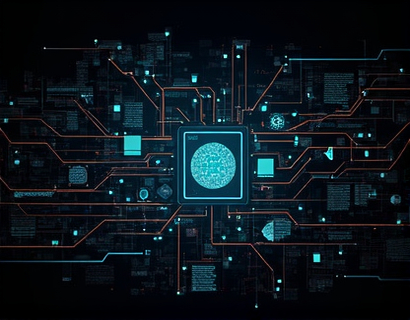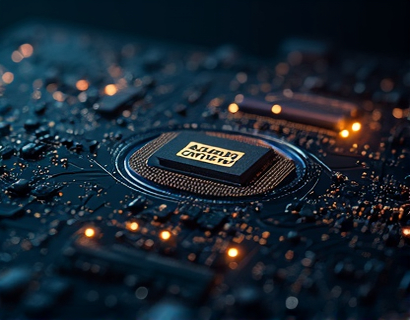Transforming Digital Experiences: The Synergy of Crypto and AI
The intersection of cryptocurrency and artificial intelligence (AI) is giving rise to a new era of digital innovation, redefining how we interact with technology and each other. This fusion is not just about combining two powerful technologies but creating a synergy that enhances user experiences, secures transactions, and opens up new possibilities for businesses and individuals alike. As we explore this transformative landscape, it's essential to understand the foundational elements and the innovative applications that are shaping the future.
Foundations of Cryptocurrency and AI
Cryptocurrency, since its inception with Bitcoin in 2009, has revolutionized the way we think about money and transactions. It introduced a decentralized, peer-to-peer system that operates on blockchain technology, ensuring transparency, security, and immutability. On the other hand, AI has been rapidly advancing, driven by machine learning algorithms, neural networks, and vast amounts of data. AI's capabilities range from natural language processing to predictive analytics, making it a versatile tool across various industries.
The convergence of these two technologies is particularly potent. Cryptocurrency provides a secure and transparent medium for transactions, while AI enhances the efficiency, security, and user experience of blockchain-based systems. This synergy is leading to the development of advanced applications that were previously unimaginable.
Enhancing Security with AI
One of the most significant benefits of integrating AI with cryptocurrency is the enhancement of security measures. Traditional cybersecurity methods are often outmatched by sophisticated cyber threats. AI, however, can analyze vast amounts of data in real-time, identifying patterns and anomalies that indicate potential security breaches. In the context of blockchain, AI can monitor transactions, detect fraudulent activities, and automate responses to threats, thereby fortifying the security of crypto assets.
Smart contracts, self-executing contracts with the terms directly written into code, can also benefit from AI. AI can ensure that smart contracts adhere to predefined rules and conditions, reducing the risk of errors and malicious activities. This combination not only secures transactions but also builds trust among users, a critical factor in the adoption of blockchain technology.
Improving User Experience through AI
The user experience (UX) is a pivotal aspect of any digital platform, and AI plays a crucial role in optimizing it. In the realm of cryptocurrency, AI can personalize user interfaces, provide tailored recommendations, and offer real-time insights. For instance, AI-driven dashboards can display relevant market data, news, and alerts, helping users make informed decisions. Chatbots powered by AI can assist users with queries, transactions, and support, providing 24/7 assistance and enhancing customer satisfaction.
Moreover, AI can analyze user behavior and preferences to create more intuitive and user-friendly applications. By understanding user patterns, AI can automate routine tasks, simplify complex processes, and offer a seamless experience. This level of personalization and efficiency is particularly valuable in the fast-paced world of crypto, where users need quick and reliable access to information and services.
Innovative Applications of Crypto and AI
The fusion of cryptocurrency and AI is giving birth to a myriad of innovative applications across various sectors. Let's explore some of these groundbreaking developments.
Decentralized Finance (DeFi)
DeFi is a prime example of how crypto and AI are transforming financial services. DeFi platforms leverage blockchain to create decentralized versions of traditional financial products such as lending, borrowing, and trading. AI enhances these platforms by providing sophisticated risk assessment tools, automated trading algorithms, and predictive analytics. These tools help users manage their assets more effectively and make data-driven decisions, reducing the risk of losses and increasing returns.
For instance, AI-powered credit scoring models can evaluate the creditworthiness of users based on a wide range of data points, including transaction history and behavior patterns. This allows DeFi platforms to offer more accessible and fair financial services to a broader audience.
Supply Chain Management
Supply chain management is another area where the combination of crypto and AI is making a significant impact. Blockchain ensures transparency and traceability in the supply chain, while AI optimizes logistics and inventory management. AI algorithms can predict demand, optimize routes, and reduce waste, leading to more efficient and sustainable operations.
Crypto assets can be used to facilitate transactions within the supply chain, ensuring secure and transparent payments. Smart contracts can automate payment processes based on predefined conditions, reducing delays and disputes. This synergy not only streamlines operations but also builds trust among all parties involved.
Digital Identity Verification
Digital identity verification is a critical issue in the digital age, and the combination of crypto and AI offers a robust solution. AI can analyze biometric data, behavioral patterns, and other factors to create secure and accurate identity verification systems. Blockchain ensures that identity data is stored securely and immutably, preventing fraud and identity theft.
Crypto-based identity solutions can empower individuals by giving them control over their personal data. Users can share verified information with service providers securely, streamlining the onboarding process and enhancing privacy. This is particularly beneficial in industries such as finance, healthcare, and government services, where secure identity verification is paramount.
Challenges and Considerations
While the potential of combining crypto and AI is immense, there are several challenges and considerations that need to be addressed. Regulatory frameworks are still evolving, and the lack of clear guidelines can pose risks for businesses and users. Ensuring compliance with existing laws and advocating for supportive regulations is crucial for the sustainable growth of these technologies.
Another challenge is the technical complexity involved in integrating AI with blockchain systems. Developing robust and scalable solutions requires expertise in both domains. Collaboration between tech experts, developers, and industry stakeholders is essential to overcome these hurdles and create innovative, user-friendly applications.
Additionally, there is a need for education and awareness among users. Many people are still unfamiliar with the basics of crypto and AI, which can hinder adoption. Providing accessible resources, tutorials, and community support can help bridge this knowledge gap and foster a more inclusive digital ecosystem.
Future Outlook
The future of crypto and AI is bright, with numerous opportunities for growth and innovation. As technology continues to advance, we can expect even more sophisticated applications that further enhance user experiences and drive digital transformation. The integration of AI with other emerging technologies such as the Internet of Things (IoT) and 5G will create a more interconnected and intelligent world.
For businesses and individuals looking to leverage these technologies, staying informed and adaptable is key. Embracing the potential of crypto and AI can lead to competitive advantages, new revenue streams, and a more secure and efficient digital presence. The journey ahead is exciting, and those who navigate it with curiosity and innovation will be at the forefront of the next digital revolution.










































